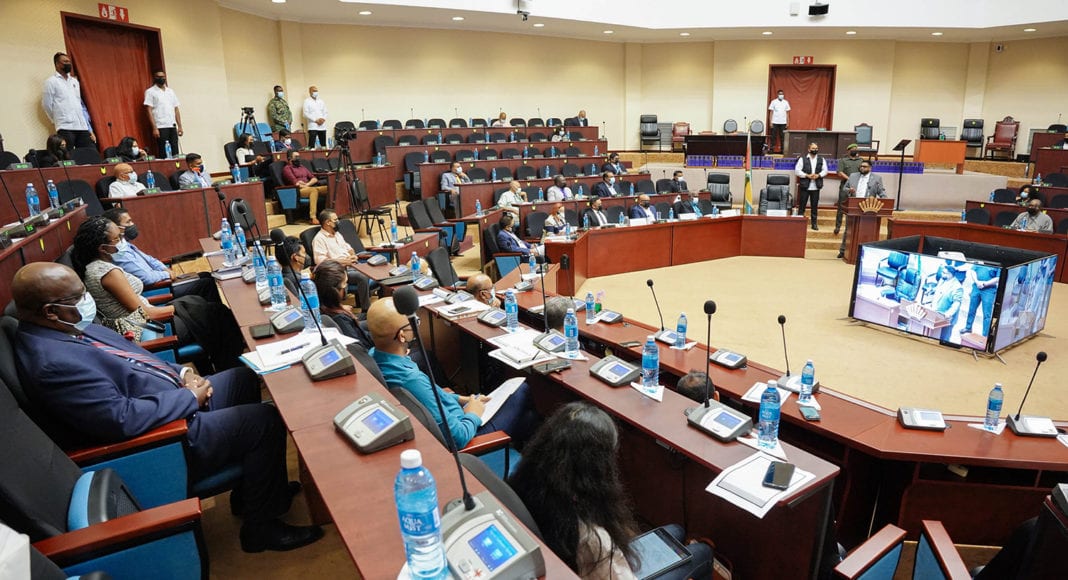During the first leg of consultations held on Monday on Guyana’s draft Local Content Policy, the discourse, which was facilitated by President, Dr. Irfaan Ali, at the Arthur Chung Conference Centre on the outskirts of Georgetown, saw commentary from various members of the private sector and those involved directly in the oil industry.
The first person to share his perspective was Nicholas Boyer, President of the Private Sector Commission (PSC). The businessman said that the Commission will digest the document and submit formal recommendations. In the meantime, however, he said that the draft policy represents a step in the right direction and builds on what was released by the previous administration. He noted that the January 2020 Local Content Policy that was released under the APNU+AFC regime did not address key areas such as the long period for payments for goods and services to new business entrants of the industry. Unlike well established players, Boyer said that this leaves small and medium scale companies at a disadvantage.
As for the President of the Guyana Oil and Gas Energy Chamber, Manniram Prashad, he was in high praise of the opening remarks made by President Ali and Vice President, Dr. Bharrat Jagdeo on the need to ensure compliance in the sector along with the fact that the pursuit of the policy should not hinder the development goals of other industries. At the same time, Prashad called for the immigration laws to be given due attention for review, especially when one looks at the influx of experts and other people who would be brought in to meet the needs of the industry.
President of ExxonMobil Guyana, Alistair Routledge, was keen to note that his company brings years of experience in helping to build local content in countries around the world while reminding that the oil operator has been playing its part in setting a foundation for Guyana to build on. In this regard, Routledge reminded of the Centre for Local Business Development (CLBD) which has a database of over 800 vendors, a massive increase from the 100 it started with when the Centre was established in 2017. Routledge also pointed out that the draft document called for there to be progressive local content targets for the provision of steel plates when Guyana does not produce same. The ExxonMobil Head noted that the targets of the policy must marry the realities on the ground while adding that the company is not in Guyana to fight or compete with anyone, but rather, promote capacity building and employment for other sectors.
Timothy Tucker of the Georgetown Chamber of Commerce and Industry (GCCI) was also part of the few who spoke to issues in the policy. For him, the proposed two-year review period for the policy was too long, given the ever-changing nature of the oil sector and Guyana’s progressive approach to development.
During her contribution, CLBD Director, Natasha Gaskin-Peters, shared that many businesses which are registered with the Centre have noted that the rigid requirement for collateral by banking institutions hampers their ability to access loans. This affects their ability to grow and qualify for more procurement opportunities in the oil sector. She noted too that the policy should seek to address this in some form while adding that the Centre remains open to supporting the government in its local content goals.
Representative from the Institute of Chartered Accountants, Vish Ramnarine, had pointed out as well that under Section 7 of the draft policy, which outlines a number of areas where oil companies should achieve progressive local content targets, accounting is not listed. The stakeholder said, “Accounting services are not listed in the draft policy and we believe we are ready to serve the industry. Our personnel are internationally certified… I know that we can be effective consultants and I hope we can be added in the list under Section seven of the policy.”
Other stakeholders from the private sector such as those connected to the Guyana Manufacturing Services and Association (GMSA), and the University of Guyana spoke broadly about the areas of capacity building which need to be addressed to ensure Guyanese are prepared to take advantage of the sector.
The consultations on the draft policy are expected to continue for one month.



